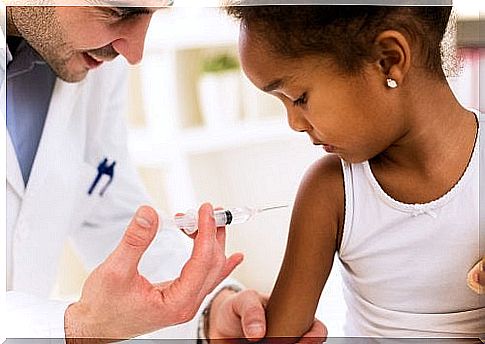What Is The Anti-vaccination Movement About?

The anti-vaccination movement is actually nothing new. It has existed since the first vaccines hit the market. However, their activities are very worrying as they endanger public and individual health.
In addition, there is no scientific evidence that speaks against vaccinations. Children and people with compromised immune systems are among the population groups most at risk from the anti-vaccination movement.
How did the anti-vaccination movement come about?
The anti-vaccination movement is a collective of people who generally reject vaccinations. They are convinced that the health risks of the vaccines, or the vaccinations themselves, are more serious than the expected benefits. In addition, there are numerous other reasons why people refuse vaccinations; it can be religious, political, philosophical or health reasons.
The first vaccine was discovered back in 1796. It was then that the English country doctor Edward Jenner described how the spread of smallpox can be prevented. What exactly was he doing? He inoculated healthy people with the pus that he had previously obtained from the wound of a patient suffering from smallpox.
And it was precisely at this time that the first vaccination skeptics appeared, including some medical professionals. Since then, and to this day, preventable diseases have broken out in many countries because the anti-vaccination movement has repeatedly prevented necessary vaccinations.
One of the anti-vaccination movement’s best-known articles was published in 1998 in the scientific journal The Lancet . In this article , the measles-mumps-rubella vaccine has been linked to autism and bowel disease.
However, six years after the article was published, it became known that the lead author, Andrew Wakefield, had a financial conflict of interest. For this reason, he had changed and modified the study results to his advantage.

After the article was withdrawn, some co-authors of this article also withdrew and revised the conclusions they had drawn from the study.
Nevertheless, the damage had already been done. This fraudulent article caused a great deal of panic among people, which resulted in a decrease in vaccinations. As a result, many preventable diseases have broken out again since then.
How does the anti-vaccination movement argue?
Several studies have analyzed the content of the websites of various anti-vaccination groups. Numerous arguments were identified, which the vaccination opponents list. These arguments can be categorized as follows:
- Religious Beliefs. In some religions, vaccinations are viewed as an external and unnecessary interference with the human body.
- Philosophical reasons . These groups are of the opinion that compulsory vaccination (which exists in some countries) constitutes a violation of a person’s individual personal rights.
- Lack of effectiveness of vaccinations. Also, some opponents of vaccination believe that the decline in vaccine-preventable diseases is not due to the vaccinations themselves. Rather, they claim that this decline is the result of socio-economic improvements.
- Risks and Consequences Associated with Vaccinations . The possible side effects of the vaccines and the risks of the vaccination itself are at the center of the argument. The opponents of vaccinations create a connection between vaccinations and certain diseases. In particular, it is about idiopathic (inexplicable) diseases and those that affect the own immune system.
- Economic profit of the pharmaceutical company. These arguments relate to the profits that pharmaceutical companies and laboratories make from vaccinations. In addition, they point out the lack of transparency between the parties involved in the vaccination chain.
- Other arguments. In addition, there are anti-vaccinations that point out the pain vaccinations can cause. They also point out the possible consequences of poor technique in the use of vaccines, etc.
What are the benefits of vaccinations?
Vaccines are among the greatest achievements and advances in the history of medicine. It’s also scientifically proven that vaccinations prevent millions of deaths each year.
However , millions of people around the world die every day as a result of illnesses that vaccinations could prevent. This may be because these people do not have access to vaccines. It could also be a direct consequence of the anti-vaccination movement’s arguments.
We want to give you some important information about vaccines:
- Vaccines are safe. In fact, they are some of the safest medical devices out there because they undergo numerous exams and tests.
- The vaccine does not trigger the disease that you are being vaccinated against.
- Vaccinations are not the cause of autism. (In addition, vaccinations prevent far more serious and life-threatening diseases).
- Of course, there is some risk of side effects. However, the benefits vaccines offer clearly outweigh the potential risks.

- Vaccines are very effective.
- Most vaccinations offer very long-lasting protection. However, there are also multiple vaccinations.
- Vaccinations are also required to maintain disease protection across the population.
- Protecting a child’s health is an ethical and moral responsibility.
- In addition , independent scientific studies support the use of vaccines.
Other benefits of vaccinations
At the moment there are no alternatives to the previous vaccines that have proven to be better or nearly as effective. Every American state requires children to be vaccinated to go to school. Nevertheless, exemptions from this vaccination requirement are possible in 47 states for religious or philosophical reasons.
Similarly , parents have a civil and moral obligation to protect their children. In this way we are creating a better society in which we protect ourselves and especially those who do not have the opportunity to be vaccinated.
Nowadays we are often not even aware of the severity of many childhood illnesses because we have not experienced the dramatic consequences ourselves. Although improved hygiene has undoubtedly helped reduce the incidence of these diseases, the influence of vaccinations in combating them cannot be denied.
Unfortunately, the anti-vaccination movement puts the health of young children and other particularly vulnerable people at risk, as they could become infected with diseases that vaccinations would prevent.









